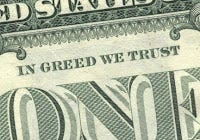Goldman Sachs is profiting off of juvenile offenders.

New York - In the New York City prison system, the outlook for juvenile offenders is bleak. They're falling through the cracks, being arrested repeatedly, and being re-released onto the same streets only to be picked up again.
The criminal justice system is failing these 16- and 17-year-olds, says Dora Schriro, the commissioners of the city's Department of Corrections.
"Just about half of them are going to return to jail in less than a year of their release from our system," she says. "And so that means right now one out of two is failing. They're being rearrested, charged with new crimes, and coming back."
So last year, the New York City Department of Corrections did something no other city in America has ever done — it asked for private, corporate investors. Goldman Sachs opted to invest $9.6 million in the Adolescent Behavioral Learning Experience program, a new curriculum that seeks to bring down the number of youth offenders going back to prison.
Alicia Glen, the director of the Goldman Sachs Urban Investment Group, says the company is investing the money over four years. It's what's called a "social impact bond." Glen says it's a a new way of thinking about financing social goods.
"Essentially what it is, is saying we can use private capital to finance a government-sponsored program," she says. "So you have the private sector paying for the service, and then the government saying if the service works, we will pay you X dollars based on the level of impact that's achieved."
New York's program is the first one in the U.S. Schriro says the city hopes that by teaching kids basic coping mechanisms, the city can reduce by 10 percent the number of kids getting rearrested.
Glen says if recidivism rates can be reduced, Goldman Sachs stands to see a return on investment. But there's still a financial risk, she says.
"If this program doesn't work at all, the city will not be repaying back our loan," she says. "So we hope and expect the program will work, and if we in fact ... are right, that they can achieve a real reduction in recidivism, Goldman Sachs stands to make $2.4 million on their investment."
Mark Rosenman, who directs the nonprofit Caring to Change, which helps nonprofits and charities decide how to get funding, says this move might be detrimental to nonprofits working on these issues.
"I think it is building a new industry of intermediaries — of consultants, of lawyers, of accountants — lots of people who are going to be involved in structuring these bonds and who will drain off resources that would otherwise go to nonprofit organizations," Rosenman says.
He also says letting private companies invest in social programs undercuts the role of government.
"We're substituting private profit for public responsibility," he says. "We are in effect saying that the market can support these activities and make a profit and allowing government to walk away from supporting the activities."
http://www.npr.org/2013/03/24/175197680/goldman-sachs-hopes-to-profit-by-helping-troubled-teens


